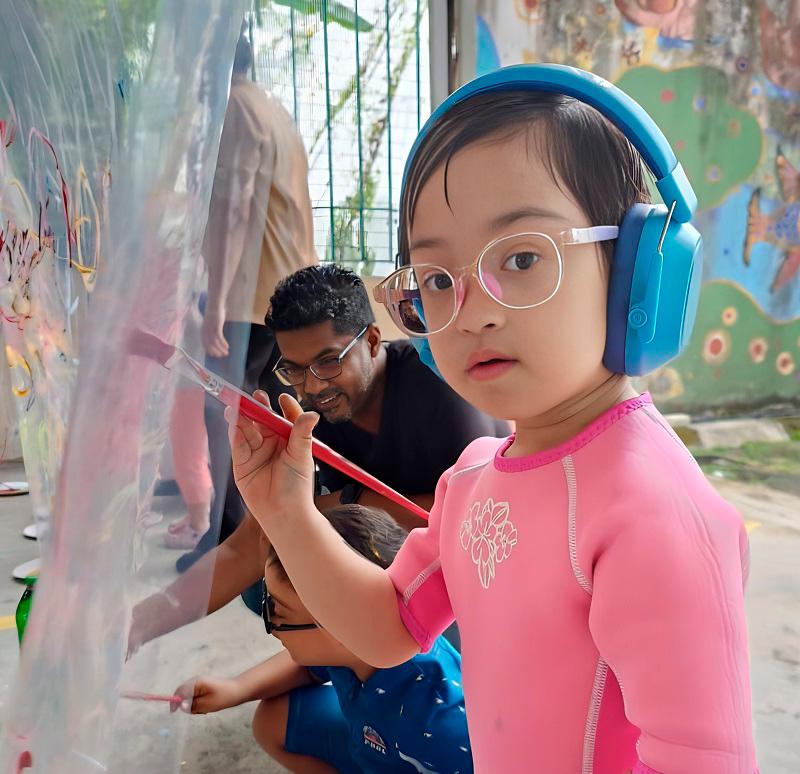PETALING JAYA: From the moment Raisa was born in 2020, her mother, Rose Zaimi Mohamed Zaid, 45, knew life would change in ways she had never imagined. As the youngest of four children, Raisa quickly carved a place in their home, filling it with love, laughter and chaos.
“I had a feeling her journey would be extraordinary, and I was right,” said Rose, who lives in Taman Sea. She first learnt about Raisa’s potential Down syndrome diagnosis through non-invasive prenatal testing at 20 weeks.
“At the time, the probability was only 20%. It was an unplanned pregnancy, and I was already feeling overwhelmed. The possibility of Down syndrome added to my uncertainty and fear,” she told theSun.
At just five months old, Raisa joined the Kiwanis Down Syndrome Foundation (KDSF) Infant Stimulation Programme (ISP), which focuses on stimulating cognitive, motor and social skills through early intervention.
Founded in 1989 by the Kiwanis Club of Kuala Lumpur, KDSF advocates early intervention for children with Down syndrome in Malaysia. The ISP caters to infants aged 2 to 24 months, offering physio and occupational therapy to help them reach developmental milestones such as rolling, crawling and walking.
“KDSF has supported nearly 3,000 children in acquiring essential skills. Raisa was one of them,” said Lee Sook Foong, KDSF’s operations director.
“Now, at nearly five, Raisa is in the School Readiness Programme (SRP1), preparing for a structured school environment.”
Rose, a homemaker, described SRP1 as a positive experience that fosters independence through hands-on activities.
“My daughter gained confidence in completing tasks like colouring or matching independently. The sensory-rich activities have been great for her.”
Raisa also attends a pre-integrated special education programme at Sekolah Kebangsaan Bandar Utama Damansara, tailored for children with special needs.
For Rose and her husband, an engineer, also aged 45, juggling Raisa’s therapy sessions, their three other children’s online schooling and early intervention was challenging, especially during the Covid-19 lockdown.
“We had to adapt then. The older kids struggled with online learning, and Raisa’s physiotherapy sessions were tiring. But we kept going, one day at a time.”
After a year of speech therapy at the audiology and speech clinic of Canselor Tuanku Muhriz UKM (HUKM) Hospital and WQ Park (a health and rehabilitation centre), Raisa began speaking at age three.
“It took about a year for her to say her first word. Once she did, her vocabulary grew rapidly.”
Rose acknowledged that services for Raisa have been accessible but expressed concern about her education and independence.
“I worry about how she’ll adapt to structured education and whether she’ll continue to thrive. Balancing support with fostering independence is always on my mind.”
Many schools in Malaysia lack resources and trained staff for children with Down syndrome, said Lee.
“Teachers may not have sufficient training to meet their unique educational needs. Inclusive education requires individualised teaching methods, learning assistants and specialists.”
Lee emphasised that early intervention and regular medical follow-ups are key to addressing gaps in support and ensuring children thrive. Conditions associated with Down syndrome require ongoing monitoring, even if the child appears healthy, she said, adding that the programme requires trained educators, therapy services and customised learning materials.
KDSF is at Lot 13490,
Jalan Jenjarum, off SS23/1, Taman Sea, 47400 Petaling Jaya. Donations can be made via Maybank at 5125-3017-2440.









